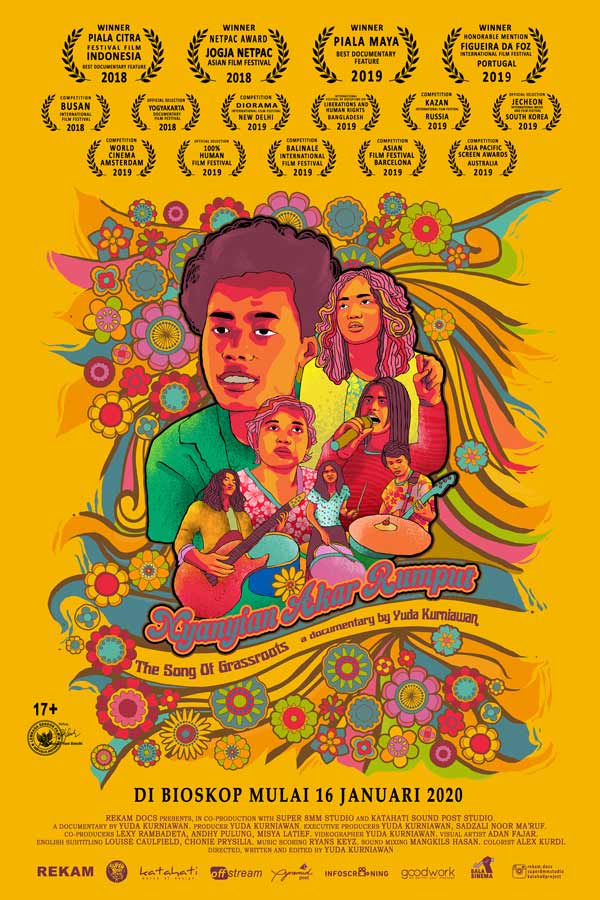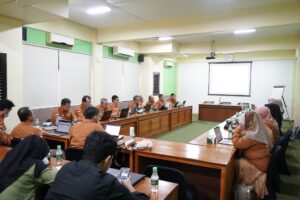
Human rights violations have become a very important issue. The Indonesian government needs to immediately resolve past and present cases of human rights violations. According to the National Human Rights Commission, from January-April 2019 there were 525 cases of human rights violations, highlighting past cases including the abduction of activists from 1997-1998. According to the survey’s results, 43.4 percent of these cases had not been completed. In addition, there are still many unresolved past cases, such as the disappearance of Widji Thukul, which inspired a Communication Sciences alumni of Universitas Muhammadiyah Yogyakarta (UMY), Yuda Kurniawan to make a music documentary film “Nyanyian Akar Rumput” (Song of Grass Roots) through the perspective of Fajar Merah, the child Widji Thukul and his family. The film will begin to air in theaters today, Thursday, January 16, 2020.
Yuda Kurniawan, the director of “Nyanyian Akar Rumput” explained that the inspiration for the film began with his knowledge of Widji Thukul and his poetry since middle school and the fact that Widji Thukul was declared missing two years after the reformation era. “I made this film because I was inspired by the poems by Widji Thukul that he made since middle school and his works were collected by my uncle. My uncle always carried a copy of a poem by Widji Thukul. From there, I became familiar with his work, although I didn’t really understand his personality. Then after entering the reformation era, I learned that Widji Thukul, the poet whose works I had read, was assassinated by the New Order. During my studies in Yogyakarta, I had the chance to make a documentary about Widji Thukul,” Yuda said when interviewed through telephone on Tuesday (1/14).
Then, Yuda told that he met Fajar Merah and started production of the documentary. “In the middle of 2013, I found out that Widji Thukul had a child named Fajar Merah. He (Fajar Merah) has a band called “Merah Bercerita” (Red Tells a Story) with one of his song singles titled “Pemadam Tembok” (Extinguishers of Walls), which is an adaptation of one of the poems of Widji Thukul. Then, I travelled to Solo to find out more about Fajar Merah and discussed with him and his family to make this film, “explained the 2006 UMY Communication Science graduate.
According to Yuda, this film is a reminder of President Joko Widodo’s promise that he had said during the 2014 presidential campaign to resolve the Widji Thukul case. “In this film, when we talk to Widji Thukul, we have to talk about human rights violations in Indonesia and its enforced disappearances, as it is an issue/case that has not been resolved to date. The Jokowi-era government, which was once hailed by this family, could not solve the case. This becomes the point of the stories in this film and tells the position of Fajar Merah as Widji Thukul’s child, “he explained.
Furthermore, Yuda conveyed the message that he wanted to convey through this music documentary. “The message that I want to convey through this film is how the government should resolve this case as soon as possible. President Jokowi had promised to resolve the case of the disappearance of Widji Thukul, but to this day it remains unresolved. I want the millennial children, especially the young people, to know who Widji Thukul is and to know the condition of his child. Fajar Merah is trying to compose the poems of his father through his music, which makes this documentary is a musical documentary for young children,” he explained.
“I hope that activists today, especially young people and students, can be more critical to what is around them, in social, economic and political issues. They must also be more critical of the government, especially to encourage the government to resolve this case because they must have empathy for victims of human rights violations, especially in this family, “closed Yuda, the UMY Kine Club alumni.
The “Nyanyian Akar Rumput” documentary is a winner of Piala Citra Award for the Best Long Documentary in the 2018 Indonesian Film Festival (FFI). This film was made in four years from 2014 through 2018. The film also won several awards in national and international levels. (sofia)






